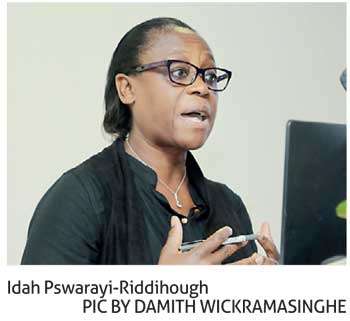11 Apr 2018 - {{hitsCtrl.values.hits}}
 By Shabiya Ali Ahlam
By Shabiya Ali Ahlam
The World Bank yesterday commended the government’s keenness in promoting good governance but laid out its ‘wish list’ that may assist authorities to ensure better governance of public enterprises.
Affirming the backing of her institution’s support to improve governance of Sri Lanka’s public enterprises, the World Bank Country Director for Sri Lanka and Maldives Idah Pswarayi-Riddihough stressed the endeavour requires a collective effort.
Laying out what she opined as “critical next steps” for better governance, Pswarayi-Riddihough pointed out that future consideration of good governance of public enterprises must apply a holistic approach, that is realigning and strengthening the State’s ownership and oversight function.
This, she added, includes improving performance monitoring and evaluation, transparency and accountability, corporate governance, and the capacity of boards and their senior management.
While greater emphasis must be placed towards increasing the ability of these institutions to compete, as competition raises the performance bar, she stressed the need to improve the overall business environment in which they operate.
“Provide opportunities for sharing lessons, creating feedback loops between the service deliverer and recipient, and rapid course correction when needed. This is imperative if not essential,” Pswarayi-Riddihough event held in Colombo, yesterday.
Furthermore, it was shared that the World Bank wishes to witness a more modernized accountability framework that would reduce unnecessary external and political influences. Alongside trimming avenues of interferences, it was suggested the legal framework be improved via a Public Finance Management (PFM) Act.
Lastly, the establishment of a central clearing house that brings together consideration on investments, revenues and budgets was encouraged as such would result in better fiscal considerations and management according to the World Bank.
Pswarayi-Riddihough also revealed that findings of a recently conducted opinion survey, carried out by the World Bank together with the government, on the perspective of citizens on public enterprises, which showed “interesting and unsurprising” results.
A summary of the findings showed that many Sri Lankans were not happy with the performance of public enterprises where 38 percent think they perform poorly, while 36 percent think that the quality of services provided are very poor.
When asked as to why public enterprises need to be reformed, the leading reason cited was to improve the quality of essential services. However, respondents also cited issues with political interference and the need for better corporate governance.
Public enterprises represent a major part of Sri Lanka’s public-sector institutions and thus their governance leaves an impression on the economy. The World Bank acknowledges that approximately 400 State-owned Enterprises (SOEs) operate in Sri Lanka where they play a key role in the country’s economy not only in terms of size, but also because they provide the most important infrastructure and services.
The total turnover of the 55 strategically important state owned business enterprises alone amounted to Rs. 1.5 trillion, equivalent to 13 percent of GDP in 2016.
With many SOEs reporting significant and persistent operating losses which get covered at the expense of core social programmes, it was highlighted that between 2012 and 2015, the net transfers from the State to public enterprises amounted to Rs. 460 billion. This figure is higher than the country’s health budget of Rs.380 billion.
Also, apart from financial sector institutions, the State is contributing more to its commercial public enterprises than receiving from them.
Reiterating that performance of public enterprises impacts directly on Sri Lanka’s competitiveness and the achievement of its socio-economic development objectives, Pswarayi-Riddihough opined: “Ultimately, everyone wants better service delivered at value for money; in a timely manner and at high quality. That to me, as a layman amongst many is what good governance means to us. We experience the impact. That’s why we should all care.”
18 Nov 2024 4 hours ago
18 Nov 2024 5 hours ago
18 Nov 2024 5 hours ago
18 Nov 2024 6 hours ago
18 Nov 2024 18 Nov 2024